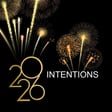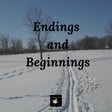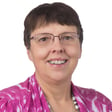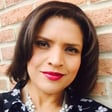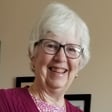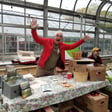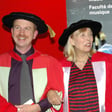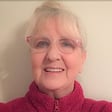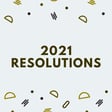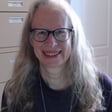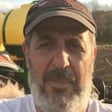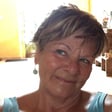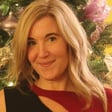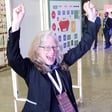Become a Creator today!Start creating today - Share your story with the world!
Start for free
00:00:00
00:00:01

Can you write to heal? Penelope Arnold hopes so.
This week, I discuss the necessity of celebrating, connecting to the community and staying active. I also speak with Penelope Arnold, whose story "The Imposter" got longlisted for the CBC writers' prize. I was extra excited to speak with Arnold because she works in Orangeville, where I grew up. We talk about anorexia, addiction, writing and missing home.
Transcript
Introduction and Personal Background
00:00:00
Speaker
At Jared, we have a brilliant selection of beautifully crafted diamond engagement rings and certified loose diamonds so that you can find the perfect one for your one and only. Best selection, best prices. Enjoy the Jared difference today. Jared, love brilliantly. My name is Tracy Ariel and I am an apologetically Canadian.
00:00:29
Speaker
And so it is November 1st as I record this and this week I'm going to be talking about how important the importance of celebration and I'm thinking about that a lot today because last night was the first night
00:00:45
Speaker
in my life that I remember actually that I did not celebrate Halloween we just closed the curtains and turned off the lights and didn't participate at all and this is even though we earlier this year we actually all went to pick up pumpkins we never did carve them I've bought a whole bunch of treats to give out to people I was going to be participating
00:01:08
Speaker
because I love Halloween and so usually I participate but yesterday I just wasn't into it and rather than fighting my mood I just decided no this year I'm not going to celebrate and I don't have any great regrets about that because I needed to sleep I was it's perfectly fine and it sort of emphasizes
00:01:27
Speaker
what I got out of it in previous years because this is sort of the last hurrah before winter hits and it's an opportunity to have a lot of fun with your neighbors and connect to people around you and I'm not as connected to people around me because I didn't participate. There's a lot of stuff on Facebook going on. I'm not part of the conversation.
00:01:49
Speaker
So it sort of emphasizes the point of what you get when you do participate, which is a really good feeling about living in a community where it's safe to give treats to a bunch of kids that come to your door and how people actually did some really innovative things to make that possible during the time of COVID-19.
00:02:10
Speaker
So it just sort of reminds me how important it is to put regular celebrations in the calendar and keep them there and to keep them alive. And so I'm definitely gonna make mixture a lot more fun for Halloween. Today is also the first first day of NaNoWriMo.
Writing Journey and Inspirations
00:02:25
Speaker
So I got up early this morning. I already did my more than 2,000 words.
00:02:30
Speaker
And I'm about to go into a brunch with everybody to start off the season. This is a really good opportunity to celebrate writing and to celebrate the desire to get a novel written in one month. And I also spent almost all day actually quite a long time yesterday updating my website. And that's because the co-op hired an intern this week. And in discussion with her about how the visual identity and brand and
00:03:01
Speaker
technological operations of the co-op function of course I couldn't help think of some of my personal brand issues and some of the things I really wanted to change about my website and so I just got down to it and finished it yesterday and of course it's always a work in progress so there's still things to be done but the new look is there and it's operational and I transferred from my host and everything is tickety-boo so that's a really good thing
00:03:29
Speaker
to start off to get ready for this winter with. It's a lot easier to think about the content and how I can actually keep my community active when some of the basic structures are in place like a website.
00:03:49
Speaker
you know, Thrive Themes, I'm a Thrive Themes member, so it's really easy to keep updating things on a regular basis. And they just came up with a shapeshifter theme, which means you can do anything you want on any page, which means that I can bring some of my websites into the same website again, which will save me money next year. So that will be
Interview with Penelope Arnold
00:04:10
Speaker
the next step. But at first I had to get the look of my personal brand and the blog and everything the way I wanted it.
00:04:16
Speaker
So if you don't like it, don't tell me because I love it and I'm very happy with it It's exactly what I wanted to do. And now I just need to focus on getting the content of stuff
00:04:25
Speaker
And that's in terms of celebrations. And none of that has anything to do, however, with the episode that I'm going to be publishing this week, which is a conversation with Penelope Arnold. I have not met Penelope, but she works in Orangeville, which is where I grew up.
00:04:49
Speaker
Um, and, but the reason that I'm contacting her is because she got short shortlisted for the CBC writers prize for her story, the imposter. So, um, hi Penelope. How are you doing? I'm fine. So can you tell me a little bit about the, cause I mean, you're not, um,
00:05:09
Speaker
You're not known as a writer in Canada. You work as a pharmacist. Yes, yeah. Well, actually, I did an English degree at Queen's. I guess I graduated in 1993 and had thought about being a journalist, but my parents are very into science.
00:05:31
Speaker
I was kind of a good girl. I was like, okay, I'll do whatever my parents want me to do. So I kind of thought, oh, I'll do something maybe medicine or pharmacy, or even they were, you know, it was just, I realized when I was younger, I wasn't very confident about stuff. So I ended up doing pharmacy, studied pharmacy, but I always loved reading and writing.
00:05:56
Speaker
So I always thought it would be so lovely to be a writer because I'm quite reclusive and I love being on my own and reading and writing. So I hadn't really written anything like this before, but because my daughter had gone through a period of illness that was quite difficult, I one day just sat down and wrote about it.
00:06:22
Speaker
And I was surprised that it did well in the occasion. But I was pleased, right, because I thought that it is a subject that I think a lot of people don't know much about. So it's a good thing to kind of talk about.
00:06:40
Speaker
Yeah, well, and your daughter didn't know that you were going to publish it before. No, no. So I had, I think it was one, like, it was very close to the deadline. And I had done this creative writing class. And at Christmas, on the last creative writing class, the teacher said, Oh, I've got these calendars, they're called contest calendars. They cost, I don't know, $20.
00:07:03
Speaker
And every month there's a contest. So if you want to improve your writing, you should enter a contest. So I thought, OK, I'll try to enter a contest every month. And so, of course, I'd miss January. So I thought, oh, February is the CPC nonfiction prize.
Impact of Personal Experiences on Writing
00:07:17
Speaker
That sounds pretty good. So I managed to get it in by the deadline and forgot all about it.
00:07:24
Speaker
like forgot all about it because of the coronavirus basically. So yeah, so it was a hot July day when I got into my car after a strenuous work shift and got this email saying, congratulations, you've made the long list. And I thought, what are they talking about? Like I've just completely forgotten about it, right? Because COVID has been so devastating, right? For in pharmacy, it's been very, very stressful.
00:07:52
Speaker
This has been stressful for everybody who's been in, I run a farmer's market and so I'm also, we've been operating every week. It's not quite as stressful as indoor locations because we're outdoors. We start, we're going to be indoors this week and it's a red zone so it's like it's much more stressful this week than it has been all summer but it is stressful when you're trying to make sure that you keep people safe.
00:08:17
Speaker
And that you know what you're doing is important. And it's just extra work. Yeah, it is. And I think too, people were panicking.
00:08:30
Speaker
And because I work at Shoppers Drug Mart, people love coming to Shoppers Drug Mart. I heard one lady go, I come here every day just to look at the deals and pick up my medicine and get my milk. And so Shoppers was the one place that was open throughout. So we were seeing everyone every day. Wow. And of course, people's fears, you know, they're they're getting upset in Shoppers Drug Mart about about the coronavirus. So it was a lot of there were a lot of emotions.
00:09:00
Speaker
within the staff, within the customers. And so it was, and then I actually got coronavirus and the store had to shut down. So that created a huge problem. Well, I think I probably got it at work, but who knows, right? So that was, and it was before the time of masks and a lot of restrictions had been put in place. It was early April.
00:09:27
Speaker
So then it was interesting because when I returned to work, some people didn't want to come near me, even though I had recovered. So the pandemic is a scary thing for people. It is. It's very scary. So it's interesting. And your story, the impostor, is actually about a scary disease as well. I mean, can you talk a little bit about the beginning where your daughter comes home from Vancouver and is very clearly
00:09:55
Speaker
not her usual self. Yes, she's not her usual, like she had transformed. And, you know, we thought she was just into fitness, which, if you have teenagers, it's a good thing to be into fitness, right? So I was like, she is the one I don't have to worry about. She was, you know, good marks and fit and did everything as she should.
00:10:19
Speaker
and then she gets off the plane and I didn't even recognize her and the problem with this illness the hardest thing is that they become someone else which is why I use that kind of theme yeah the imposter it's someone you don't even recognize yeah like literally physically you don't recognize them and also mentally like her her humor had gone her
00:10:40
Speaker
her affection, she was just this, you know, I am exercising, I am running 30 kilometers a day and not eating properly, right? So you watch the weight. What's the disease called? Because it's um,
00:10:55
Speaker
Also, well, it's anorexia nervosa, but which which, you know, and I said in in the essay, really, that people use anorexic like the word anorexic as an adjective to describe models or to describe thin girls and it and there's an element of of it being voluntary, you know, like people think, oh, well, she wants to be skinny. So she's skinny. Yeah, without the image, but they actually see different images in the in the mirror and everything.
00:11:23
Speaker
Yes. Like us psychiatrists would use the word egosyntonic. They see something else. They see beauty. In her case, she was seeing muscle because she lost all her fat. To her, that translated into a very fit and healthy person.
00:11:42
Speaker
And you can't change the mindset. That's why I wrote it because it's coming up against a brick wall of they are so stubborn about it. Or I shouldn't say they, she was very stubborn. But I know that the problem with treating this illness is that the patient doesn't see what the problem is.
00:12:02
Speaker
So what did you do? She's healthy now, right? She's healthy now, but she did go through a stage where the physician she was seeing in Mississauga said, well, she might have to be hospitalized because the heart rate
00:12:22
Speaker
is compromised, the heart is compromised, all the organs. And you're talking about a person who used to be fully healthy six months ago is now in kidney failure. And you just can't really comprehend it. And it's very devastating because the one person who can help herself, she just won't because she is someone else. It's like she's someone else.
00:12:48
Speaker
So, you know, and I think parents do, they get angry, they're angry at their child, like, just eat, like, just stop this. And there's no point being like that, right? You can't, and the counselor said to me, you have to separate the illness from the child. Until you can do that, you're going to still be angry, you're going to be angry and upset. And so,
00:13:13
Speaker
we called her, like we had another name for her. She said she called, we called her Lucille. I don't know how we got that name, but she was Lucille when she was a different person. And so it, cause they say it helps them to see, to separate the illness from themselves. And it did help her that that did help her. But it is a really difficult thing to watch your child just
00:13:38
Speaker
sink down and you can't really do a lot. Well you captured that emotion so well in your story too. I mean that was what was so captivating about reading it is that you really felt that
00:13:53
Speaker
that all of the emotions, like the fact it began with your shock and then it went through with your actually understanding it and then trying to help and I mean, it was a very well written story. Congratulations. Oh, thanks. Thanks very much. Thanks. And so how does it feel to get recognition for this personal story? You know, I mean, you had to tell her. Well, I know. I mean, everybody is reading about this, you know.
00:14:20
Speaker
I know when I realized it had been short or longlisted, I messaged my daughter and said, I'm really sorry that I've written this story and now other people are going to read it. And I actually have never really told you that I wrote it.
00:14:36
Speaker
she thought it was kind of funny she's like oh my gosh but she knows you know i get quite emotional about the children so she's like oh it was probably good for you to write it like she's very understanding and um and and now she's so good about talking about her illness that she because she says if it helps other people it would be a good thing right
00:14:54
Speaker
Right, right. Exactly. So I'd like to think it could help other people. Yeah, because when I was investigating it, when she had first been diagnosed, I had read a blog from a lady in Australia with a daughter. And it really helped me to know that there were other people who were as mystified
Themes of Addiction and Stigma in Writing
00:15:11
Speaker
as I was about this behavior, right? Yeah. Yeah. And then once she's seeing a medical professional, you don't actually get access to what they say or anything, right? So how did you handle that?
00:15:22
Speaker
No, no. And then you wonder, like, and the whole time you're just feeling guilty, I'm like, are they saying that it's my fault? Did I do something wrong? You know, and and I was always very careful about never saying much about weight and things to the girl, you know, because I have another daughter, too. And so I thought, no, I didn't do that. But you as a parent, I think when some things happen to your child, you you kind of blame yourself. Well, at least I do. Right. I'm
00:15:50
Speaker
I kept saying, you know, I just kept in the counselling because it was always myself and my daughter and a counsellor and she'd say, oh, you're crying, but that's good. You know, and I said, it's because I feel guilty. She goes, you don't have to feel guilty. This is not your fault, right? But you do feel that it is your fault. I don't know. Well, I think, I mean, I'm a parent, too, and I feel guilty even when they're perfectly fine. So
00:16:19
Speaker
Yes. Exactly right. It's just this burden of guilt. I find that there seems to be in society that it's always the mother's fault too, especially rather than just parents' fault. I mean, it can be parents' fault more, but it seems like mothers get brilliant more often than fathers, but depending on the situation, of course.
00:16:46
Speaker
But it was a great story. And I was interested in reading also that you're actually looking at writing other projects around very serious things. Because you were saying your next project results around the opioid crisis. You had a crisis. Yeah, because I thought, like, I find that
00:17:16
Speaker
I mean, community pharmacy, you see a huge range of illness and situations. But in Orangeville, there are quite a few people who have addictions to opioids. And I think there's a lot of stigma with addiction.
00:17:37
Speaker
I mean when I grew up in Orangeville there was opioids weren't a thing then but there was we had the dogs you know there was a big drug problem and we had dogs in every Friday at the high school and there was a house that sold
00:17:54
Speaker
all sorts of other things just up the street. The problems with drugs are not new. I think every community has some sort of that.
00:18:09
Speaker
Yeah, I think so. I think you're right. And so I just, I thought, you know, you go up like Zyna Street, such a pretty street with all these pretty houses, and then just a few blocks over, you're kind of in this neighborhood and you're thinking, oh, would I walk here late at night? But you know, it's interesting to me that people
00:18:31
Speaker
lives side by side and some people have no idea about the lives of their neighbors and it's not really about that but it's about someone like a couple who dose like they take methadone to overcome an addiction and they have a child and I always have wondered when people come to dose methadone at our pharmacy that
00:18:53
Speaker
you see them with their children and you wonder, I wondered one day what that child was thinking as she watched her mother drinking the methadone. Like, is she thinking that this is a medicine or is she thinking that this is just a nice drink? And the child didn't ask anything. So I thought they've told her something. I just don't, I just sometimes wonder. And so I thought it'd be interesting to have a book about this child, like her prospects for her future
00:19:19
Speaker
you know and what her life would be like. So I started writing a book about it and it's I think I've been trying like it's been it's a couple of years old but it's so the creative writing class was you go to the class and you give chapter by chapter to your colleagues and they critique it.
00:19:37
Speaker
And so there was, of course, there's a lot of criticism. And you have to be able to take the criticism, which is good. But sometimes it's discouraging, right? Yeah, I guess it would be. Especially when it's such a when it's a work in progress, I'm surprised that that there would be a lot of criticism with a work in progress. Like, it seems to me. Yes. Well, well, I think, like,
00:20:02
Speaker
Yeah, some people are very encouraging others are very critical, but then you think well this would be my audience and this is quite a Range of ages that around this table with different experiences And if they're all saying that this voice isn't the good you know this is this point of view isn't good I should change my point of view
00:20:23
Speaker
then I would follow what they were saying. But what was interesting is that one of the ladies there, and I hadn't said that I was a pharmacist, she said, well, I just don't believe that people would go up to the pharmacist and get dosed for methadone. And she goes, I think you need to do a bit more research.
00:20:41
Speaker
That's the one thing you know the most about. That's the one. I know. Wow. I know. So I said, well, actually, I do this every day. And so they were absolutely shocked, right? And I thought, to me, that was so interesting that people aren't aware of it. Like, they are just not aware that people are being dosed to withdraw from Mobius. Well, how would you be aware? Like, unless you happen to be a patient, I mean, who else would know?
00:21:14
Speaker
in the news about naloxone kits and you know as an antidote to opioid overdose and some people take more of an interest than others but I guess you wouldn't know and then but then there's the whole yeah and yes so that's why I thought that's why I thought a book would be a good way of maybe informing people you know like I don't know I don't even know if it's appropriate for me to write about this but I don't know
00:21:34
Speaker
Yeah, who else would know? That's true. Like there's a lot of
00:21:44
Speaker
So it's a novel. So it's fictional. It is fictional completely. But it's taken from experience, right? So
00:21:56
Speaker
Well, I mean, um, what's that wonderful, uh, author, the, who does the, who's a coroner? Oh, yes, about murders. Yeah. Oh, yes. I know what you mean. Yeah. Yes, exactly. Yeah. But the thing is, I, what I find interesting is there's also, you know, people who are, who are professionals who are, who take methadone, who want to hide it. You don't want to.
00:22:26
Speaker
be seen. And, and you have to be very careful with that kind of thing. But so, you know, it's difficult, it's a difficult subject, because it's a very private thing. But I do think addiction is more common than people realize. Right.
00:22:45
Speaker
Yeah. Oh, I'm sure it is. I mean, I think that's one thing about small towns versus cities like mine is you can ignore all sorts of problems that are right around you because you don't know everybody. Yeah, no, you're right. You're right. I mean, everybody knows everybody.
00:23:03
Speaker
But I had one patient who said, you know, you're taking an oxycodone and you're always early requesting it. So this is a sign of opioid use disorder. And he was so angry, so angry that I said that.
00:23:23
Speaker
And I said, I'm not being personal. I'm just telling you that the first sign is refilling your prescription two days, like two days early, then four days early. I said, so you're not taking just four a day, now you're taking six a day. So this is the most highly addictive medication out there, oxycodone.
00:23:44
Speaker
So then a couple of days later, I got a call from his doctor saying, you can talk to the patients like this. And I said, well, this is ridiculous. I've done the course at CAMH, like the Center for Opioid and Mental Health, right, Center for Addiction and Mental Health. So
00:24:02
Speaker
I think more physicians and more pharmacists need to take this course. And so then a week later, this patient's wife turned up and said, you can't talk, you talked to my husband as though he was a street person, she said. And I said, what is a street person? I said, anyone can become addicted to medication, anyone, like medication or like you can't just, it's not just one portion of society that has this problem.
00:24:32
Speaker
So that's when I decided to write this book. And they're not in the book or anything like that. But it just tells me that people don't believe that it can happen to them. Yeah, well, very clearly they can't. I mean, they feel like they can't. But I mean, even though all the warnings are there, I mean, I guess if you're
Balancing Pharmacy and Writing
00:24:54
Speaker
you're taking it for whatever reason, you're not paying attention to those warnings anymore. Yeah. Yeah. And you're right. It's like post-surgical painkillers, right? So yeah, they make you feel great. So you want more, but yeah. And this is a big problem, right?
00:25:12
Speaker
Yeah it is a big problem and it's but it'll be interesting to see what you um that how your novel progresses and I can understand the feeling of uh having I have a book that's been around that I'm still working on since 1996 so I've written many other books and things since then but it's like there's some projects that just take time to percolate I think. Yeah I think you're right and then and so I wasn't I kind of lost confidence
00:25:42
Speaker
in the book. But then the CBC contest has given me a bit of a boost, right? So it's like, okay, I think I can do this, right? So it's kind of nice. If you think, because I think too, like I just turned 50. So I was like, oh my gosh, am I going to be doling out pills when I'm 80 still? I need to do something else with my life.
00:26:11
Speaker
And I really love writing. Yeah, well, why not? It's certainly when you've shown that you can get not only a topic that attracts people's interest, but also you've written in a way that garnered awards. So you know that you can do it with a short story. So surely you can do it with a novel too.
00:26:33
Speaker
Oh, well, thanks, Tracy. That's very encouraging of you. My other question, because you are a full time pharmacist, how does writing fit into your life? Like, what's your schedule? What do you do? How do you make it work?
00:26:47
Speaker
Well, so what I do is because I like the three till ten shift because I'm not a morning person. I'm pretty bad at the morning I like to do like lighthouse work and possible groceries in the morning and then I go to work But then at 11 p.m. I'm like fully awake and you know, so that's when I will write from like 11 till 1 maybe so you work at work and then and then I'll like
00:27:12
Speaker
like 11, or so I work at the in the pharmacy. Oh, okay. So you have a late schedule, everything then. Okay. Yeah. Yeah, I have a late schedule. And then and then I do my writing sort of 11pm to one or 2am because I because no one's around. And I kind of I seem to have more energy. Whereas we're offices that way.
00:27:36
Speaker
Yeah, yeah, yeah. Well, I used to be at night out when I was in high school and things, but I mean, since I had kids, I still get up at the time that they used to wake me up. They're no longer awake, but that's when I write. I write from six until nine. See, that's so good. I admire people who get up early. I really do. Because obviously having small children almost killed me because they get up so early and I'm like, oh my God. I don't think it matters which way you do it as long as you make time to do it, right?
00:28:07
Speaker
Yeah, you're right. You're right. So because like, yeah, it's funny. So I mean, that's, I'm sorry, I was gonna ask you what other kinds of things you write? Like, are you writing? Are you working on the novel all the time? Or do you have other projects? Well, well, I had a bit of a break.
00:28:26
Speaker
because i kind of make things up as i go and i've tried like umpteen times to make an outline and i can't do it i just can't stick to it so i just kind of write the novel when i'm in the mood like i'll suddenly think oh this would be good so then i'll go and scribble it down but but so what i had done is join this online it's i think it's a british um website called readsy i don't know i know and they do it they put
00:28:55
Speaker
all right well they just do a short story prompt every week so some things just catch my imagination and then i'll write a short story and i usually i always submit it to them and i've never ever like won anything and i don't know how reputable it is but it has it sparks me to kind of do something which i think is good i think we see is very reputable and it has a um it actually you can hire editors and things through that site too and so no there's nothing wrong with it i mean and who cares as long as it works for you
00:29:24
Speaker
okay um are you gonna be part of no i know you're right have you heard of the national writing national novel writing uh um uh what is it called and then oremo so it's a national rating
00:29:39
Speaker
Uh, hold on. Let me look at my email for it. But, uh, basically every, every year in November, um, there's a, there's non-profit, it's 9oramo.org. And they do a, a challenge to write 50,000 words in a month. And they have all sorts of writing prompts and all this kind of stuff too. So that the idea is that you would finish your novel in a month. Have you ever participated in that?
00:30:09
Speaker
No, no. It's N-A-N-O-W-R-I-M-O
00:30:19
Speaker
And actually, our conversation will be published probably during NaNoWriMo, because I think it's four weeks from now that it's going to be published. But basically, it's NaNoWriMo, and what you are is you're called a pantser, which means that you don't play your books, right? Oh, yes.
00:30:40
Speaker
And so you can actually you can actually you have like not you you're basically I'm a planner, I'm a pantser and then or I'm a planter, which means that you plan some of it, but then you you pick it up after that, you know. So it's really interesting. But anyway, so NaNoWriMo and if you go to National Novel Writing Month, if you just plug that into into Google, you'll find it. But it's it's basically NaNoWriMo
00:31:13
Speaker
And they have a ton of different, and they have local community writers who get together. And this will be my first year doing it as well. So I think it's really exciting. Oh, so that. Yeah, that's exciting. So thanks a lot. I will.
00:31:28
Speaker
I will do that I think because that I kind of was in a rut you know. Well that's the thing is the advantage of this is that there's a whole bunch of other people um there's quite a few Canadians I know I'm in the Montreal sector so I don't know who's in Ontario but I suspect that there'll be some people in your neighborhood that you will be able to find either if not in Orangeville then somewhere nearby.
00:31:49
Speaker
and you can join that chapter and then there's like a forum to discuss things and they've already been sending out prompts because I haven't decided what book what I'm going to work on for the month but so every second day I get this thing saying have you decided what you're working on for NaNoWriMo yet and get ready and so it's like it's very every day in your email list that you get this feeling like um it's basically on the first of October it was like countdown to NaNoWriMo high writers you know and so it's really quite exciting
00:32:21
Speaker
I'll look that up. Yeah, that's so good. I mean, the writer said is very, very difficult. I've been a writer since 1993, a full-time writer since 1993, and it changes every single year. That is always the hardest thing. It never really improves. I mean, you always need help.
00:32:46
Speaker
Yeah, I know, it's true. It's true because I'm like, where am I going with this? And then with the criticism group, I was like, oh my God, everyone hates this. But then when I, so you have to send in a hard, oh no, you send it to the people a week before and then you all meet.
00:33:04
Speaker
And they printed it off with all their comments. So when I looked back at them, they were actually more encouraging than I had realized at the time. So it's funny. Criticism is funny, but it can put you off, right? It can really put you off. Yeah, well.
00:33:21
Speaker
I'm part of a genealogy writers group and we meet once a month and everybody gives the Monday before the meeting is like the fourth Wednesday of the month and every the Sunday before we extend our stories to each other and then people comment on them and the meeting is basically taken up with comments but I find it this particular group is so positive everybody's so positive that it turns out to be just a
00:33:49
Speaker
And now, we also have lots of comments. I mean, we have to almost always redo our stories after all the comments, so it's not like there were some criticism. But it's such rewarding criticism because everyone loves the stories so much, you know? Oh, that's so nice. That's very nice. Very supportive, right?
00:34:07
Speaker
Yeah, so you may want to encourage your, your critics, your criticism group that, you know, maybe you, they should, you could add a section to say, okay, everything you like about the story first. Oh, yeah. Good idea. Yeah, I think so. And I could see like, if someone, you know, you must say three things versus, you know, if you have a criticism, you have to find two positive things to say for every criticism or something. You could take the
00:34:33
Speaker
to turn the picture around. Yeah, you're right. Like my daughter says it's a criticism sandwich, like good then bad in the middle and then good again, yeah.
00:34:43
Speaker
Because yeah, just so that you focus on some of the positive things too, because everybody has a talent. And then what's interesting is if you're focusing on the on the positive things, you find out who has the talent in the group. And so then, you know, if you have something you're struggling with, who is good at that? You know, like we have one person who's particularly good at description, and another person who's really good at dialogue. And we have a poet in the group also.
00:35:09
Speaker
And one is fun we have There's two people who are particularly funny. Oh So you want to go for if you're trying to write something funny, I know and and I love humorous books, right? Yeah It's hard to be a writer sometimes it is really hard it is really hard So but Tracy that's very encouraging. Thanks so much. I
00:35:35
Speaker
This is great. Oh, you're welcome. Like I said, I'm so excited. I'm hoping that your project will be done soon because I think it's really, really important. The opioid crisis is something that everybody needs help with for sure. And it's interesting because it gets a lot of attention in the States, but it doesn't get so much attention in Canada.
00:35:57
Speaker
Right. Yeah, you're right. Is it as strong, is the problem as difficult here as it is in the States or is because we have healthcare, are people caught and helped earlier or something? Yeah, I think people are helped.
00:36:13
Speaker
see the support that people who, like, there's a couple who have now four children, they're very young, and the one of them has just been put into rehab, which is great. And she's so the husband is looking after the kids with his mother. And I'm looking at them going, how are they coping, you know, but they just, they seem very positive, and they're getting a lot of help from
Opioid Crisis and Education
00:36:35
Speaker
you know, everyone. And I thought that's really a good thing, though it's taken quite a long time for it to happen. But I, you know, I don't know, like, it's difficult. I was speaking to one of the doctors at Orange, like Headwaters Healthcare, like the hospital. And she said, well, we haven't had a lot of training on say suboxone, which is a new way to treat withdrawal.
00:37:02
Speaker
And so I was going through the rules with her from the CAMH template and she's like, well, thanks very much. And we're also having someone coming in to show us, but so I thought that's good, right? But there needs, I think there needs to be more communication really between physicians and pharmacists and nurse practitioners.
00:37:19
Speaker
And so that could be another avenue even on the local side. I was thinking, you know, just more education, right? Because the CAMH course, like shoppers paid for me to do it and it was expensive. I think it was like $1,200 for me. They paid for me to go. And I was like, there are a lot of practitioners who would balk at paying that, you know, to spend two days in Toronto. And it's, you know, like they would really, like people have other expenses and other things to do, right?
00:37:49
Speaker
So even if the, sorry, sorry, I was just going to say if there's, um, is there a public information somewhere? Cause we can link to that in the show notes too. Oh, right. Yeah. Like I, um, I'm not sure, like, well, it's like, it's cam H they do a professional course every year.
00:38:10
Speaker
I mean, I think it's in, I think it was, yeah. So it's C-M-C-A-M-H and they always have a physician talking to other health professionals about opioid, you know, methods of rehabilitation. And I know it's... Oh, good. The CAMH has a...
00:38:32
Speaker
CAMH has a website, they have a OIPO edition page. Oh, okay. So I can link to that. Okay, good. That's good. Because I think, because it was such a... Like a public page that says OIPO. Yeah, like it's, it's... Because it talks about... Sorry. Sorry. Yeah, no, sorry. Go ahead. Like it, it just, it's, it's very helpful. It was like so helpful for me, like so helpful. Because you get a lot of situations where the doctor will phone you saying, well,
00:39:02
Speaker
He's in withdrawal. What, you know, what dose should I give? And I'm like, well, so there's a distinct protocol to, to help people if they've decided to stop using heroin, for instance, and how much they need to start on methadone or suboxone. And so they go through very specific case studies. And another, another problem too, is over the counter Tylenol ones, which contain eight milligrams of codeine. People abuse them hugely.
00:39:31
Speaker
And they're available in the pharmacies and pharmacists give them out like candy. And that was another thing. So I've changed my practice since then where I don't give Tylenol ones. I gave out 30 and after I've talked to the patient for quite a while. But, you know, they're available as pack as 200 bottles, pack of 200 bottles. And so that's 1600 milligrams of coating right there, which is a lot of coating.
00:39:59
Speaker
And that's just available over the camera. No prescription needed. So things like that need to be addressed. Yeah. Yeah. People come up from the States and get, yeah, they get time with coding because in the States they won't sell it over the camera. And so, um, now the other thing that actually says is that you can get a free naloxone kit. Yeah. So naloxone is so if you, yeah, if you overdose,
00:40:27
Speaker
It's an antagonist to any opioids, so it can save their life. Because basically, if you take an overdose of an opiate, your breathing stops. It's a respiratory depressant. So you die because you don't breathe. So it antagonizes that procedure. So it's a life-saving, easily accessible
00:40:53
Speaker
medication but so they can come in anyone can come in and get it free the government will pay for it.
00:41:00
Speaker
And so we get a lot of people coming in. Yeah, that's what this page says. Because it says that basically if you or someone you know uses opioids, it's good to have one on him. Exactly, exactly. So that's good to know. I mean, it's got it, you know, because somebody who knows somebody can just get out one of these kits and at least they can save their life. Yeah, exactly. There is some sort of overdose. And yeah, and they've made it now a nasal spray. So you just instead of using a needle, which you might be uncomfortable with doing, you just stick it up the nose and deploy the spray. And there it's it's very clever. It's good.
00:41:31
Speaker
Wow. That's fascinating. Like I said, if I hadn't been interviewing you, I wouldn't know anything at all about that. I've never heard of it. Other than the news stories on the internet that sort of fly by Facebook every now and
Cultural Identity and Immigration
00:41:46
Speaker
then. Yeah. Well, that's good.
00:41:50
Speaker
Yeah, so you know that this is unapologetically Canadian. So my last question is, do you consider yourself Canadian? And what does that mean to you? Well, yes, I do. Because I like my parents moved over for because my father is South African. And he's actually non white and was sort of a really had a pretty nasty time in Cape Town in 1950s. Right. So
00:42:17
Speaker
went to England and because he wasn't he always wanted to be an engineer and wanted wasn't allowed to be an engineer as he wasn't white so he went to England because mother saved up and saved up to send him and he ended up studying medicine.
00:42:35
Speaker
he works and he's a pretty smart guy. I went to the University of Liverpool, met my mum who's also studying medicine. And then in the 60s, I guess, the Canadian government was advertising for British doctors to go because they needed doctors here. So they moved over in 1967, I think, to Hamilton and then were put out in Walkerton where they were the only doctors in a large area. And
00:43:02
Speaker
but then eventually moved to Waterloo. So they've been in practice in Waterloo for like 40 years. But so, yes, we all consider... Did they still have practice? Well, my mom just stopped. And actually what stopped her was COVID. She got COVID in the middle of her practice. So, yeah, we had to shut it all down. It was pretty bad. But yeah, so we all enjoy Canada very much.
00:43:31
Speaker
and it's been a great place for dad because he was able to sponsor all his brothers and sisters because he was one of nine out from South Africa and so considers Canada a great country where you know equal rights everyone's seen for who they are not the color of their skin so it you know it's it was a good move on his part you know
00:43:56
Speaker
Oh, that's fascinating. Wow. And so you were born in Britain? I was born in Britain because mom, like they came over to Hamilton and it's funny because my husband's from Hamilton, but mom's like, oh, it was just like, I was so homesick for England because she's from like Hereford where the Hereford cows are from. Like it's all farmland. It's beautiful, right?
00:44:16
Speaker
So she would work for a bit and go over to visit her mom, have a baby, get pregnant in Canada, go and have a baby in England. Like she was, she found it hard. She found it hard. Like she's quite homesick, but now she's fine. Right. But it, the first few years were hard. Right. Cause.
00:44:34
Speaker
they didn't know anyone they were you know i think it was difficult but now you know obviously with time everything changes but they had seven children so where did you grow up so we grew up where did you grow up yeah so i was born in heraford in england then they bought a house in waterloo because they were a bit like mom's like a walkerton it was just like it was mom quite likes a busier city
00:45:00
Speaker
So when and Waterloo then was not busy, but they so they established a practice in in Waterloo and bought a house. And they're still in that house. Yeah, in in Waterloo. Wow.
00:45:15
Speaker
So, and so I grew up with farmland, you know, and they sent us to school in Toronto and people in Toronto were like, where do you live again? Where is Waterloo? Like, I was like the hick. And now of course, it's famous for the university. But it's like they thought I was a real hickster. So it was quite funny.
00:45:38
Speaker
This is the University of Toronto? No, this is at... Which school? Well, because they sent us to the Toronto French School. Because they wanted us to learn French. Because get this, they were like, we like to go to France and eat lovely food and have the wine, but we can't speak French. So one year my dad took over his big Ford van with his seven kids. And we spent the summer just driving through France with all of us like under 10 going.
00:46:10
Speaker
Asking them to be like, can you get out and ask them how I put pump this gas? Can you ask us where? Can you ask them where we can stay for the night? And no one wanted to have like two adults and seven children.
00:46:26
Speaker
Yeah, that's very hard. Like they would have to have two hotel rooms. I know. Sort of with a door. I know. That would be very difficult. And now that I've had three children, my parents were great.
00:46:37
Speaker
and seven children under 10. Yeah. So seven in 10 years. And they were all like, oh, well, we'll just take the car over because we won't be able to fit any, like the European cars will never fit us all. And dad on that trip got so many offers from people. People would come up and go, like say to us in French, ask your father how much he would sell this van for. It's like, I can't sell this van. We need this van.
00:47:04
Speaker
So, yeah, my parents are very interesting, right? Everyone I know is like, you have to write a book about your parents, right? Like their first date, like their first date in Liverpool, my mom's like, oh, we were at this ice rink and this small band was playing. And it turned out, they turned out to be quite famous. I was like, what band was that? She's like, the Beatles. I'm like, your first date was on an ice rink with the Beatles? Like unknown Beatles, right?
00:47:34
Speaker
They're so funny, Margaret. Oh my god, that sounds fabulous.
00:47:46
Speaker
And so do you have, do you have Canadian citizenship? Yeah, so we all have Canadian. Are you dual? Yeah, so we're dual citizens because we, I guess that's how it happened. And yeah, so we have British passports and Canadian passports. So it's been really, we've been very lucky, like we're very lucky that my parents were able to, yeah, like finance us to like travel and
00:48:14
Speaker
even though it was a bit hairy at times, they were all about, you know, education, travel, and opening your eyes and acceptance of people, which is great, right? Yeah, so. And so what about your, you're also, your children are also adults. Yeah, so so I studied pharmacy in England. And because I, I love it there, right? So I was
00:48:39
Speaker
like I and my grandma lived there and she wasn't doing so well so I thought well I could study and go and keep an eye on her and then I so I had gone to Queens and met my my then boyfriend at Queens and he he came over with me and got a job at Barclays Bank and so we lived there for 12 years and then came back
00:48:58
Speaker
So I've kind of spent, I really spent most of my life in Canada and then had a 12 year gap in England and then came back. But so my eldest daughter, so Madeline actually is studying in England right now because I think that it's good to travel and experience different cultures, right? That I've always taught them that, that if you can do it, it's a good thing.
00:49:21
Speaker
And I think part of her struggle too, that's why I felt guilty, I guess, because she was far away from home and a little bit homesick and struggling with eating and exercise. And so I was like, oh, she was too young to go away. And so that was part of it. But now she's so happy and is fine.
00:49:44
Speaker
So, but whereas my son, he's a homeboy and he's at, he's at Guelph, which is only 20 minutes from here, Guelph University. And he loves being home and doesn't really love traveling. So it's so funny, right?
00:49:59
Speaker
Yeah, children are on their own people. So how would you describe your feeling about Canada? Do you consider yourself a Canadian? Yes, I do very much. Yeah, like I do love England, but the last time I was there, I was really homesick for Canada. And when I lived there, I was so homesick in the winter, just for the snow. And you know, Thanksgiving, like this time of year, I love with the trees turning.
00:50:25
Speaker
And just, and how everyone is so like, you know, you feel really proud to be Canadian, like in the Olympics, it's so nice when they do well. Do you know what I mean? Like, it's just, you feel, and then the reputation abroad, like, if you go to Canada, like, oh, Canadians are so nice. They're just so nice. And, you know, I always have to say, I'm not American. I'm not American.
00:50:48
Speaker
Which is terrible, it sounds terrible, but people's attitudes do change when they hear you're Canadian. So it's funny. So I'm really happy living here. I'm really lucky where I live. It's a nice area and I'm lucky in my job that I'm needed and I have a job.
00:51:11
Speaker
So it's a good thing. And yeah, and it's been busy. Yeah. Well, thank you very much. I really appreciate your conversation today. It's really interesting to hear because your experience is so wide ranging. And thank you very much. Thanks a lot, Tracie, very much.
00:51:33
Speaker
Thank you for listening to Unapologetically Canadian. Please consider supporting our podcast for $2.99 a month. Join select listeners and get additional episodes every month.
00:51:57
Speaker
Mary redeemed a $50,000 cash prize playing Chumba Casino online. I was only playing for fun, so winning was a dream come true. Chumba Casino is America's favorite free online social casino. You, too, could have the chance to win life-changing cash prizes. Absolutely anybody could be like Mary. Be like Mary. Log on to ChumbaCasino.com and play for free now. No purchase necessary. Void prohibited by law. 18-plus terms and conditions apply. See website for details. The voice of the preceding commercial was not the actual voice of the winner.

